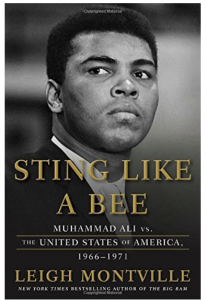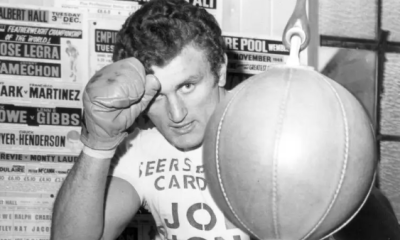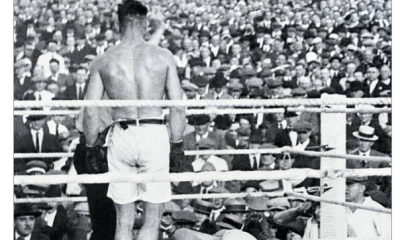Featured Articles
Renowned Author Leigh Montville Talks About Muhammad Ali, The Myths and The Man

Over the course of five-decades-plus, Leigh Montville has delivered books on the careers of Babe Ruth, Ted Williams, Dale Earnhardt, Jim Calhoun, Manute Bol, Evel Knievel, John Montague and Muhammad Ali. Each is well-written and researched and tells an interesting story, but it’s the 2017 book “Sting Like A Bee: Muhammad Ali vs. The United States Of America, 1966 – 1971,” that somehow stands apart.
The reason is because it deals with a five-year block when he wasn’t boxing and had a legal battle on his hands after refusing to be inducted into the military for religious reasons.
“I was looking for a book topic and floated one to my editor at Random House, Jason Kaufman, but he rejected it. He said I should look for an iconic figure, someone like Ruth or Williams or Earnhardt, who had been previous subjects. I made a list of iconic sports figures, all kinds of people, but felt I was missing someone,” explained Montville, whose most recent literary offering is, “Tall Men, Short Shorts: The 1969 NBA Finals: Wilt, Russ, Lakers, Celtics, And A Very Young Reporter.” “Bing! It hit me. Muhammad Ali. The most iconic sports figure of our time.”
Montville then went searching for everything that had been written about Ali in book form.
“I looked to see what had been done on Ali. The best book was ‘King Of The World’’ by David Remnick, which I had read. His story stopped when Ali beat [Sonny] Liston and became a member of the Nation of Islam,” he said. “I thought that this end was when Ali’s most interesting period really began, all of the legal stuff, his time of banishment, his grand return to face [Joe] Frazier in the Fight of the Century. I had no interest in doing a full-scale biography, but this five-year period was fascinating to me.”
Montville’s time researching that period unearthed several interesting finds.
“A bunch of misconceptions have developed about Ali in the rush to confer a sort of secular sainthood on him. He wasn’t a big civil rights guy. He wasn’t a great resister of the Vietnam War,” he pointed out. “He promoted a sort of segregationist philosophy, the idea that black people should have their own land, their own society, a place away from white people. It was a sort of Give Us Kansas and let us live by ourselves. He never marched once with Martin Luther King. During the war, he went to one rally, and didn’t like it. He never went again. He was fighting to keep himself out of the army, not anybody else.”
Montville, a sportswriter and columnist at the Boston Globe for more than two decades and a senior writer for a dozen years at Sports Illustrated, added: “He was a kid who had fallen into a cult. His white-guy, businessmen backers in Louisville sent him to Miami and set him up with Angelo Dundee as a trainer, but they didn’t set up anything for his down time when he wasn’t training,” he said. “That was when he fell under the spell of the Nation of Islam’s rhetoric.”
Views and opinions were extremely varied on Ali then. Where did Montville, who has been honored with the Red Smith Award and the PEN/ESPN Award for Literary Sports Writing, fit in?
“I’m only 18 months younger than Ali and I was going through the worries about the draft at the same time he was,” he said. “I joined the National Guard. I thought he had just found a clever way to get out of it, a way that was open if you had money and lawyers. He was never a villain in my mind, just a guy working the angles.”
Montville’s view is somewhat different more than five decades later. “I give him a bit more credit now,” he said. “I think he said a lot of those things that got him in trouble just off the top of his head and then had to back them up. I give him credit for seeing them through. I never thought he was a hero during this time, though his views on Vietnam were a lot like mine. It was a bad war.”
During this period the Black Muslims played an important role in Ali’s life.
“The Black Muslims ultimately were very good for Ali. They made him who he was. He would have been another boxer – a very good boxer, to be sure, maybe, yes, the greatest – if it were not for the Muslims,” Montville said. “The time period of my book, the stretch where he was cast out of boxing, followed by the comeback, was what made Ali different. He became a world figure, not just an athlete. Ali never would have been Ali if it were not for the Muslims. He would have been Cassius Clay, a very good fighter, but not much more.”
During the turbulent decade of the 1960s, Ali was front and center and a folk hero to some.

“I think he’s been captured forever as the face for the Sixties. No documentary of the time can get more than 30 seconds in without having his image flash on the screen, usually backed by some music by the Doors,” said Montville, a graduate of the University of Connecticut. “I don’t think this will change. His importance only has grown in recent years and, as memories of the time get reduced to catch-phrases and sound bites, he is perfect. ‘I got nothing against them Viet Cong!’”
Was Ali a tool for the Nation of Islam? “I think he was a pawn in the beginning. He was the religion’s big catch, the convert brought into the boat and posed in public relations pictures with the Honorable Elijah Muhammad,” Montville said. “I think things got sketchy when the Honorable Elijah Muhammad realized that Ali had become bigger than he was, the embodiment of the faith. The pawn became the king. That was the problem.”
What period of Ali’s storied life appealed most to Montville? “The part of Ali’s life I liked best was when he didn’t have money and was going around to the colleges, often with his wife, doing his talks, sort of an evangelical minister,” he said. “There was a purity about him then. He was young and misguided, for sure, but he believed what he was doing. When he came back to boxing, all of that disappeared. He became much more venal, sometimes nasty, a creature of the world.”
Montville continued: “The sainthood all came after he retired, after he became sick,” he noted. “I think the sainthood is a myth, but the man underneath, the narcissist, was human and fascinating. You look at his success and he used a lot of the same messaging that [Donald] Trump used. Except he used it first.”
If Ali was boxing today, would he stand out?
“No. Not at all. He came along at a time when boxing was much more important than it is now and when network television was much more important,” Montville said. “He had a captive audience when only three networks were in operation. He would be competing now with other sports, leagues, the constant stream of games and people and other entertainment. His greatest act has been copied by so many people, it would sound ordinary today, kind of ridiculous. At best, he would be a Colin Kaepernick kind of rebel, but on a smaller stage because boxing is a much smaller stage now.”
Is it justified that Ali has been looked at differently since he retired from the ring?
“His years of illness probably did more for Ali’s image than anything,” Montville said. “He became like one of those celebrities who died young – Marilyn [Monroe], James Dean, whoever – captured in their prime forever. No matter that he was still alive. He wasn’t out in the world, living, doing things no one expected.”
Montville added: “When he came into the public eye for the last 30 years or so, he was a shambling, Mother Teresa kind of character, beloved by all. If he hadn’t been sick, he would have been out in the everyday world, living, falling into the pitfalls of divorce, drink, whatever,” he said. “Joe Namath, another idol of that time, does those stupid commercials for Social Security supplement insurance. Ali would have done the same and his star would have been diminished.”
Editor’s Note: “Sting Like a Bee: Muhammad Ali vs. the United States Of America, 1966-1971,” is available via Amazon and found at better bookstores everywhere.
Check out more boxing news on video at the Boxing Channel
To comment on this story in the Fight Forum CLICK HERE
-

 Featured Articles4 weeks ago
Featured Articles4 weeks agoThe Hauser Report: Cinematic and Literary Notes
-

 Book Review4 weeks ago
Book Review4 weeks agoMark Kriegel’s New Book About Mike Tyson is a Must-Read
-

 Featured Articles2 weeks ago
Featured Articles2 weeks agoThe Hauser Report: Debunking Two Myths and Other Notes
-

 Featured Articles3 weeks ago
Featured Articles3 weeks agoMoses Itauma Continues his Rapid Rise; Steamrolls Dillian Whyte in Riyadh
-

 Featured Articles4 weeks ago
Featured Articles4 weeks agoKotari and Urakawa – Two Fatalities on the Same Card in Japan: Boxing’s Darkest Day
-

 Featured Articles2 weeks ago
Featured Articles2 weeks agoNikita Tszyu and Australia’s Short-Lived Boxing Renaissance
-

 Featured Articles3 weeks ago
Featured Articles3 weeks agoIs Moses Itauma the Next Mike Tyson?
-

 Featured Articles4 weeks ago
Featured Articles4 weeks agoRamirez and Cuello Score KOs in Libya; Fonseca Upsets Oumiha





















